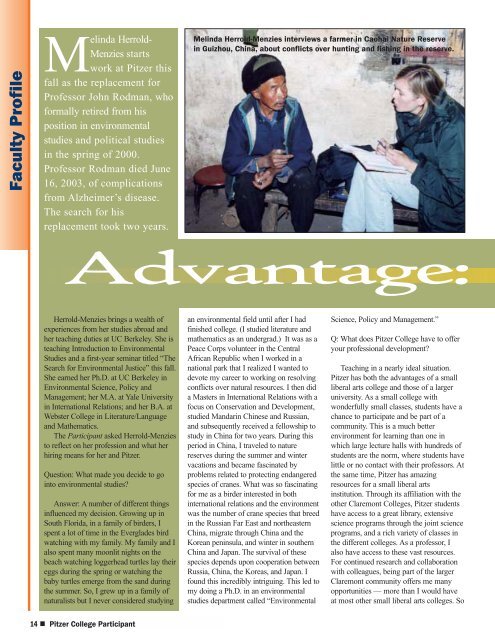Fall 2003 Participant - Pitzer College
Fall 2003 Participant - Pitzer College
Fall 2003 Participant - Pitzer College
You also want an ePaper? Increase the reach of your titles
YUMPU automatically turns print PDFs into web optimized ePapers that Google loves.
Faculty Profile<br />
Melinda Herrold-<br />
Menzies starts<br />
work at <strong>Pitzer</strong> this<br />
fall as the replacement for<br />
Professor John Rodman, who<br />
formally retired from his<br />
position in environmental<br />
studies and political studies<br />
in the spring of 2000.<br />
Professor Rodman died June<br />
16, <strong>2003</strong>, of complications<br />
from Alzheimer’s disease.<br />
The search for his<br />
replacement took two years.<br />
Melinda Herrold-Menzies interviews a farmer in Caohai Nature Reserve<br />
in Guizhou, China, about conflicts over hunting and fishing in the reserve.<br />
Advantage:<br />
Herrold-Menzies brings a wealth of<br />
experiences from her studies abroad and<br />
her teaching duties at UC Berkeley. She is<br />
teaching Introduction to Environmental<br />
Studies and a first-year seminar titled “The<br />
Search for Environmental Justice” this fall.<br />
She earned her Ph.D. at UC Berkeley in<br />
Environmental Science, Policy and<br />
Management; her M.A. at Yale University<br />
in International Relations; and her B.A. at<br />
Webster <strong>College</strong> in Literature/Language<br />
and Mathematics.<br />
The <strong>Participant</strong> asked Herrold-Menzies<br />
to reflect on her profession and what her<br />
hiring means for her and <strong>Pitzer</strong>.<br />
Question: What made you decide to go<br />
into environmental studies?<br />
Answer: A number of different things<br />
influenced my decision. Growing up in<br />
South Florida, in a family of birders, I<br />
spent a lot of time in the Everglades bird<br />
watching with my family. My family and I<br />
also spent many moonlit nights on the<br />
beach watching loggerhead turtles lay their<br />
eggs during the spring or watching the<br />
baby turtles emerge from the sand during<br />
the summer. So, I grew up in a family of<br />
naturalists but I never considered studying<br />
an environmental field until after I had<br />
finished college. (I studied literature and<br />
mathematics as an undergrad.) It was as a<br />
Peace Corps volunteer in the Central<br />
African Republic when I worked in a<br />
national park that I realized I wanted to<br />
devote my career to working on resolving<br />
conflicts over natural resources. I then did<br />
a Masters in International Relations with a<br />
focus on Conservation and Development,<br />
studied Mandarin Chinese and Russian,<br />
and subsequently received a fellowship to<br />
study in China for two years. During this<br />
period in China, I traveled to nature<br />
reserves during the summer and winter<br />
vacations and became fascinated by<br />
problems related to protecting endangered<br />
species of cranes. What was so fascinating<br />
for me as a birder interested in both<br />
international relations and the environment<br />
was the number of crane species that breed<br />
in the Russian Far East and northeastern<br />
China, migrate through China and the<br />
Korean peninsula, and winter in southern<br />
China and Japan. The survival of these<br />
species depends upon cooperation between<br />
Russia, China, the Koreas, and Japan. I<br />
found this incredibly intriguing. This led to<br />
my doing a Ph.D. in an environmental<br />
studies department called “Environmental<br />
Science, Policy and Management.”<br />
Q: What does <strong>Pitzer</strong> <strong>College</strong> have to offer<br />
your professional development?<br />
Teaching in a nearly ideal situation.<br />
<strong>Pitzer</strong> has both the advantages of a small<br />
liberal arts college and those of a larger<br />
university. As a small college with<br />
wonderfully small classes, students have a<br />
chance to participate and be part of a<br />
community. This is a much better<br />
environment for learning than one in<br />
which large lecture halls with hundreds of<br />
students are the norm, where students have<br />
little or no contact with their professors. At<br />
the same time, <strong>Pitzer</strong> has amazing<br />
resources for a small liberal arts<br />
institution. Through its affiliation with the<br />
other Claremont <strong>College</strong>s, <strong>Pitzer</strong> students<br />
have access to a great library, extensive<br />
science programs through the joint science<br />
programs, and a rich variety of classes in<br />
the different colleges. As a professor, I<br />
also have access to these vast resources.<br />
For continued research and collaboration<br />
with colleagues, being part of the larger<br />
Claremont community offers me many<br />
opportunities — more than I would have<br />
at most other small liberal arts colleges. So<br />
14 <strong>Pitzer</strong> <strong>College</strong> <strong>Participant</strong>






![Anticipated Courses SP14 [pdf] - Pomona College](https://img.yumpu.com/25363335/1/190x245/anticipated-courses-sp14-pdf-pomona-college.jpg?quality=85)










